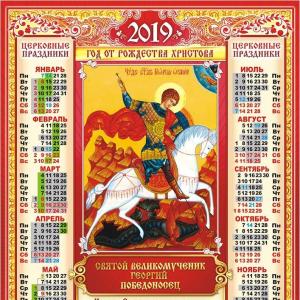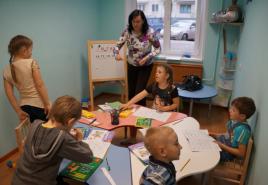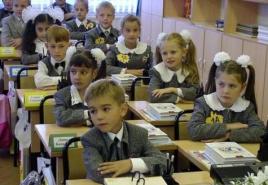Leadership tests for teenagers. Leader Tests
richest man Huntington Hartford from the USA once said that it is not the people who get along great with the boss who do everything that he says that become millionaires. Such people can only become highly paid employees. Along with Hartford, millionaire Paul Getty believes that no one on the planet will get much if they work for someone else. When you need financial success in life, then the business should be personally led. And you? Can you say that you see yourself in the ranks of leaders in a couple of years, firmly answer that “I can and will do it!”?
Test "I am a leader!"
People think that being a leader is a birthright, but it's not. You can become such a person, most importantly, develop the necessary qualities every day. And in six months you will not be recognized. In the meantime, you can independently check whether you have leadership potential by passing the tests with answers below.
Team Leadership Test
The soldier who does not try to grow up to the general is bad. This is to the fact that even with low performance in the tests, it is clear that there is room for improvement. It is clear that someone's leadership qualities are highly developed, some did not use them at all. And it is not a fact that people whose leadership potential is poorly developed will be bad leaders in the future.
You have a lot intellectual potential, people obey you, many follow you? Then you are definitely a born leader. Doubt it? Then the leadership test will prove otherwise. It will show what you are strong in, what useful qualities and features you have, how exactly you position yourself. Questioning will increase personal influence on people.
Being a leader is not easy, but all roads are open to such a person in life. And he reaches leadership positions effortlessly. That is why, when hiring, companies check the creative, intellectual and leadership potential of a future employee. Do you have these qualities? Check it out yourself.
Who you are? Leader or subordinate? Or maybe you are at a crossroads in your soul and you yourself do not know what you are worth? Take this quiz to find out if you have leadership qualities within you. Can you become an organizer and lead the team behind you? And if this is not the case, then what needs to be done for this. Detailed answers will help to get to the bottom of the truth.
The leadership test will help determine the level of your internal energy, the ability to accept independent solutions the ability to influence others. Perhaps you still have to work on yourself in order to show leadership abilities.
The Leadership Quiz will let you see if you have the makings of a leader, the ability to lead others, or if you prefer someone else to take responsibility for choosing a successful course of action.
The test for leadership in a team will clearly show your personal and leadership qualities, communication skills. You will be able to determine what features in behavior you lack in order to feel confident in any company.
The test to determine the intellectual potential will allow you to objectively assess your level of intelligence, professional quality and the level of their implementation. Perhaps you should pay more attention to the systematization of the knowledge gained and direct all your efforts to the development of hidden potential.
The test What kind of leader you are will help you look at yourself from the outside and objectively assess your qualities as a leader. Perhaps, for the successful development of the company, you should slightly change your attitude towards subordinates or to the organization of work.
Test for creative potential will help open all your hidden abilities. Now you can correctly direct your energy to achieve new goals and achieve success in new areas of life.
The Supervisor or Subordinate test will tell you which type of employee suits your professional and personal qualities. It is up to you to decide whether to accept the result or change something in your behavior to achieve career growth.
The rank potential test will tell you your ability and willingness to take the top position. It may be worth paying attention to some features of your behavior in order to quickly reach the desired place in the hierarchy.
A psychological test to determine your leadership abilities will help you determine which of two groups of people you belong to: leaders or subordinates. Remember that every person is unique, and in order to reach your full potential, you need to know yourself better. Answer all questions honestly and without much thought. At the end of the test, you will be given an assessment of your leadership abilities with some comments. Our online test: [Leadership Test] is completely free without SMS and registration! The result will be shown immediately after the answer to the last question!
The test contains 13 questions!
Start test online:
Other tests online:| Test name | Category | Questions | ||
| 1. | Determine the level of your intelligence. The IQ test lasts 30 minutes and contains 40 simple questions. | intelligence | 40 | |
| 2. | IQ test 2 onlineDetermine the level of your intelligence. The IQ test lasts 40 minutes and contains 50 questions. | intelligence | 50 | Start test: |
| 3. | The test allows you to improve your knowledge of road signs of the Russian Federation, approved by the rules traffic(SDA). Questions are randomly generated. | knowledge | 100 | |
| 4. | Test for knowledge of the states of the world by flags, location, area, rivers, mountains, seas, capitals, cities, population, currencies | knowledge | 100 | |
| 5. | Determine the character of your child by answering the simple questions of our free online psychological test. | character | 89 | |
| 6. | Determine your child's temperament by answering the simple questions of our free online psychological test. | temperament | 100 | |
| 7. | Determine your temperament by answering the simple questions of our free online psychological test. | temperament | 80 | |
| 8. | Determine the type of your character by answering the simple questions of our free online psychological test. | character | 30 | |
| 9. | Determine the most suitable profession for you or your child by answering the simple questions of our free psychological | profession | 20 | |
| 10. | Determine your level of sociability by answering the simple questions of our free psychological online test. | sociability | 16 | |
| 11. | Determine the level of your leadership abilities by answering the simple questions of our free online psychological test. | leadership | 13 | |
| 12. | Determine the balance of your character by answering the simple questions of our free online psychological test. | character | 12 | |
| 13. | Determine the level of your creativity by answering the simple questions of our free online psychological test. | capabilities | 24 | |
| 14. | Determine the level of your nervousness by answering the simple questions of our free online psychological test. | nervousness | 15 | |
| 15. | Determine if you are attentive enough by answering the simple questions of our free psychological online test. | attentiveness | 15 | |
| 16. | Determine if you have a strong enough will by answering the simple questions of our free online psychological test. | strength of will | 15 | |
| 17. | Determine your visual memory level by answering our free online psychological test. | memory | 10 | |
| 18. | Determine your level of responsiveness by answering the questions of our free online psychological test. | character | 12 | |
| 19. | Determine your tolerance level by answering our free online psychological test. | character | 9 | |
| 20. | Determine your lifestyle by answering our free online psychological test. | character | 27 |
Test "Diagnostics of leadership abilities (E. Zharikov, E. Krushelnitsky)"
To take the test, you will need a piece of paper and a pen.
Purpose of the test:
The presented technique allows assessing a person's ability to be a leader.
Test instructions:
You are offered 50 statements to which you need to answer "yes" or "no". The average value in the answers is not provided. Don't think too long about the statements. If in doubt, still put a mark on "+" or "-" ("a" or "b") in favor of the alternative answer to which you are most inclined.
Test material:
1. Are you often the center of attention of others?
a. Yes;
b. no.
2. Do you think that many of the people around you are in a higher position in the service than you?
a. Yes;
b. no.
3. Being in a meeting of people equal to you in official position, do you feel like not expressing your opinion, even when it is necessary?
a. Yes;
b. no.
4. When you were a child, did you enjoy being a leader among your peers?
a. Yes;
b. no.
5. Do you feel pleasure when you manage to convince someone of something?
a. Yes;
b. no.
6. Do you ever get called an indecisive person?
a. Yes;
b. no.
7. Do you agree with the statement: “All the most useful things in the world are the result of the activity of a small number of outstanding people”?
a. Yes;
b. no.
8. Do you urgently need an adviser to guide your professional activities?
a. Yes;
b. no.
9. Have you ever lost your cool while talking to people?
a. Yes;
b. no.
10. Do you enjoy seeing that others are afraid of you?
a. Yes;
b. no.
11. Do you try to occupy a place at the table (at a meeting, in a company, etc.) that would allow you to be the center of attention and control the situation?
a. Yes;
b. no.
12. Do you think that you make an impressive (impressive) impression on people?
a. Yes;
b. no.
13. Do you consider yourself a dreamer?
a. Yes;
b. no.
14. Do you get frustrated if people around you disagree with you?
a. Yes;
b. no.
15. Have you ever been involved in the organization of labor, sports and other teams and collectives on your personal initiative?
a. Yes;
b. no.
16. If what you planned did not give the expected results, then you:
a. you will be glad if the responsibility for this matter is assigned to someone else;
b. take responsibility and see it through to the end.
17. Which of the two opinions do you prefer?
a. a real leader must himself do the work that he leads, and personally participate in it;
b. a true leader should only be able to lead others and not necessarily do the job himself.
18. Who do you prefer to work with?
a. with submissive people;
b. with independent and independent people.
19. Do you try to avoid heated discussions?
a. Yes;
b. no.
20. When you were a child, did you often encounter your father's bossiness?
a. Yes;
b. no.
21. Are you good at discussions on professional theme win over those who previously disagreed with you?
a. Yes;
b. no.
22. Imagine this scene: while walking with friends in the woods, you lost your way. Evening is approaching and a decision must be made. How will you do it?
a. leave the decision to the most competent of you;
b. you just won't do anything relying on others.
23. There is a proverb: "It is better to be the first in the village than the last in the city." Is she fair?
a. Yes;
b. no.
24. Do you consider yourself a person who influences others?
a. Yes;
b. no.
25. Can failure to take initiative cause you to never take the initiative again?
a. Yes;
b. no.
26. Who, in your opinion, is a true leader?
a. the most competent person;
b. the one with the strongest character.
27. Do you always try to understand and appreciate people?
a. Yes;
b. no.
28. Do you respect discipline?
a. Yes;
b. no.
29. Which of the following two leaders do you prefer?
a. the one who decides everything himself;
b. one who always consults and listens to the opinions of others.
30. Which of the following leadership styles do you think is best for the type of institution you work for?
a. collegial;
b. authoritarian.
31. Do you often get the impression that others are abusing you?
a. Yes;
b. no.
32. Which of the following portraits more closely resembles you?
a. a person with a loud voice, expressive gestures, will not go into his pocket for a word;
b. a person with a calm, quiet voice, restrained, thoughtful.
33. How will you behave at a meeting and conference if you think your opinion is the only correct one, but the rest do not agree with you?
a. keep silent;
b. you will defend your opinion.
34. Do you subordinate your own interests and the behavior of others to the work you do?
a. Yes;
b. no.
35. Do you feel anxious if you are given responsibility for some important matter?
a. Yes;
b. no.
36. What would you prefer?
a. work under the direction of a good person;
b. work independently, without a leader.
37. How do you feel about the statement: “In order for family life to be good, it is necessary that one of the spouses makes decisions in the family?
a. I agree;
b. disagree.
38. Have you ever bought something based on the opinions of other people, and not on the basis of your own need?
a. Yes;
b. no.
39. Do you consider your organizational skills good?
a. Yes;
b. no.
40. How do you behave when faced with difficulties?
a. lower your hands;
b. there is a strong desire to overcome them.
41. Do you reproach people for people if they deserve it?
a. Yes;
b. no.
42. Do you think that your nervous system able to withstand the stresses of life?
a. Yes;
b. no.
43. What would you do if you were asked to reorganize your institution or organization?
a. I will make the necessary changes immediately;
b. I will not rush and first I will carefully consider everything.
44. Will you be able to interrupt a talkative interlocutor if necessary?
a. Yes;
b. no.
45. Do you agree with the statement: “In order to be happy, one must live unnoticed”?
a. Yes;
b. no.
46. Do you think that every person should do something outstanding?
a. Yes;
b. no.
47. What would you like to be?
a. artist, poet, composer, scientist;
b. outstanding leader and politician.
48. What kind of music do you enjoy listening to?
a. mighty and solemn;
b. quiet and lyrical.
49. Do you get excited when you look forward to meeting important and famous people?
a. Yes;
b. no.
50. Have you often met people with a stronger will than you?
a. Yes;
b. no.
Test key:
The sum of points for your answers is calculated using the key to the questionnaire.
Key: 1a, 2a, 3b, 4a, 5a, 6b, 7a, 8b, 9b, 10a, 11a, 12a, 13b, 14b, 15a, 16b, 17a, 18b, 19b, 20a, 21a, 22a, 23a, 24a, 25b, 26a, 27b, 28a, 29b, 30b, 31a, 32a, 33b, 34a, 35b, 36b, 37a, 38b, 39a, 40b, 41a, 42a, 43a, 44a, 45b, 46a, 47b, 48a, 49b, 50b.
For each answer that matches the key, the subject receives one point, otherwise - 0 points.
Interpretation of test results
* If the score is less than 25, then the qualities of a leader are weakly expressed.
* If the score is within from 26 to 35, then the leader's qualities are moderately expressed.
* If the score is from 36 to 40, then leadership qualities are strongly expressed.
* If the score over 40, then this person as a leader prone to dictatorship.
"Communicative and organizational skills"
V.V. Sinyavsky, V.A. Fedoroshin (KOS)
In professions, which in their content are associated with the active interaction of a person with other people, communicative and organizational skills act as the core ones, without which success in work cannot be ensured. The main content of the activities of workers in such professions is the management of teams, training, education, cultural, educational and consumer services for people, etc. According to the results of the answers of the subject, it becomes possible to identify the qualitative features of his communicative and organizational inclinations.
Instruction: Each question must be answered "yes" or "no". If you find it difficult to choose an answer, you still need to lean towards the appropriate alternative (+) or (-).
Questionnaire text
Do you have many friends with whom you constantly communicate?
How often do you manage to persuade the majority of your comrades to accept your opinion?
How long have you been worried about the feeling of resentment caused to you by one of your comrades?
Do you always find it difficult to navigate in a critical situation?
Do you have a desire to establish new acquaintances with different people?
Do you enjoy social work?
Is it true that you find it more pleasant and easier to spend time with books or some other activity than with people?
If there are any obstacles in the implementation of your intentions, do you easily retreat from them?
Do you easily establish contacts with people who are much older than you?
Do you like to invent and organize various games and entertainments with your friends?
Is it difficult for you to join a new company for you?
How often do you put off things that need to be done today?
Do you find it easy to connect with strangers?
Do you strive to get your comrades to act in accordance with your opinion?
Is it difficult for you to get used to the new team?
Is it true that you do not have conflicts with your comrades because of their failure to fulfill their duties and obligations?
Do you seek to get to know and talk with a new person at an opportunity?
Do you often take the initiative in solving important matters?
Do people around you annoy you and do you want to be alone?
Is it true that you are usually bad at navigating in unfamiliar surroundings?
Do you enjoy being around people all the time?
Do you get irritated if you can't finish what you started?
Do you feel embarrassed, uncomfortable or embarrassed if you have to take the initiative to get to know a new person?
Is it true that you get tired of frequent communication with friends?
Do you like to participate in collective games?
Do you often take the initiative in resolving issues that affect the interests of your comrades?
Is it true that you feel insecure among people you don't know well?
Is it true that you rarely seek to prove your case?
Do you think that it is not difficult for you to bring revitalization to a company unfamiliar to you?
Are you involved in social work at school?
Do you strive to limit the circle of your acquaintances to a small number of people?
Is it true that you do not seek to defend your opinion or decision if it was not immediately accepted by your comrades?
Do you feel at ease when you are in a company you do not know?
Are you willing to start organizing various events for your comrades?
Is it true that you don't feel confident and calm enough when you have to say something to a large group of people?
Are you often late for business meetings, dates?
Is it true that you have many friends?
Are you often embarrassed, feel awkward when communicating with unfamiliar people?
Is it true that you are afraid of the prospect of being in a new team?
Is it true that you do not feel very confident surrounded by a large group of your comrades?
Results processing and interpretation
Communication skills - answers "yes" to the following questions: 1, 5, 9, 13, 17, 21, 25, 29, 33, 37; and "no" to questions: 3, 7, 11, 15, 19, 23, 27, 31, 35, 39.
Organizational skills - answers "yes" to the following questions: 2, 6, 10, 14, 18, 22, 26, 30, 34, 38; and "no" to questions: 4, 8, 12, 16, 20, 24, 28, 32, 36, 40.
The number of answers matching the key is calculated for each section of the methodology, then the estimated coefficients are calculated separately for communicative and organizational skills according to the formula:
K = 0.05 . C where
K - the value of the estimated coefficient
C is the number of answers matching the key.
Estimated coefficients can vary from 0 to 1. Indicators close to 1 indicate a high level of communication and organizational skills, close to 0 - a low level. Primary indicators of communicative and organizational abilities can be presented in the form of assessments indicating different levels of the studied abilities.
Communication skills:
Organizational skills: Analysis of the obtained results.Subjects who received a score of 1 are characterized by low level manifestations of communicative and organizational inclinations.
The subjects who received a score of 2, communicative and organizational inclinations are inherent at a level below the average. They do not strive for communication, they feel constrained in a new company, team; prefer to spend time alone with themselves, limit their acquaintances; have difficulty connecting with people and speaking in front of an audience; poorly oriented in an unfamiliar situation; do not defend their opinions, they take grievances hard; manifestation of initiative in social activities is extremely reduced, in many cases they prefer to avoid making independent decisions.
The subjects who received a score of 3 are characterized by an average level of manifestation of communicative and organizational inclinations. They seek contacts with people, do not limit the circle of their acquaintances, defend their opinion, plan their work, but the potential of their inclinations is not very stable. Communication and organizational skills need to be developed and improved.
Subjects who received a score of 4 belong to the group with high level manifestations of communicative and organizational inclinations. They do not get lost in a new environment, quickly find friends, constantly strive to expand their circle of acquaintances, engage in social activities, and help relatives. Friends, show initiative in communication, take part in organizing social events with pleasure, are able to make an independent decision in a difficult situation. They do all this not under compulsion, but according to their inner aspirations.
The subjects who received the highest score - 5, have a very high level of communication and organizational inclinations. They feel the need for communication and organizational skills and actively strive for it, quickly navigate in difficult situations, behave at ease in a new team, are proactive, prefer to make independent decisions in an important matter or in a difficult situation, defend their opinion and strive for it to be accepted by their comrades, can bring revival to an unfamiliar company, like to organize various games, events. Persistent in activities that attract them. They themselves are looking for such cases that would satisfy their need for communication and organizational activities.
How to identify leaders in a team? Psychological tests to identify leadership qualities. These tests and game tasks will help to identify leaders in the class team, leaders in the camp, as well as determine the value orientations of team members.
Test and game tasks to identify leaders, certain value orientations
Social Interest Test
On pieces of paper it is necessary to depict triangles (one per sheet). The vertices of the triangles are circles denoting other people (for example, "P" - parents, "P" - teacher, "D" - friends, etc.). The children should place the circle labeled "I" in relation to each of the triangles. If the circle is placed inside the triangle, then the child perceives himself as part of this group (“P”, “P”, “D”, etc.), if outside, then separately (see Fig.).
The child needs to draw two circles anywhere on the sheet: “I” and close person(mother, father, grandmother, grandfather, friend, etc.).
The closer the circles are to each other, the more the child identifies (correlates) himself with another person (Fig.).

Test "Who are you?"
(identification of personal qualities)
The child is invited to choose the figure that he likes best (Fig.).

Square- industriousness, diligence, the need to bring the work begun to the end, perseverance, which allows you to achieve the completion of the work - this is what true Squares are famous for. Endurance, patience and methodicalness usually make the Square a highly qualified specialist in his field. A square loves a routine once and for all: everything should be in its place and happen in its time. The ideal of the Square is a planned predictable life, he does not like "surprises" and changes habitual course events.
Rectangle- symbolizes people who are not satisfied with the way of life that they lead now, and therefore are busy looking for a more suitable position. So best qualities Rectangle - curiosity, inquisitiveness, a keen interest in everything that happens and courage. Rectangles are open to new ideas, values, ways of thinking and living, and easily assimilate everything new.
Triangle symbolizes leadership. The most characteristic feature of the true triangle is the ability to focus on main goal. Triangles are energetic, unstoppable, strong personalities who set clear goals and usually achieve them! They are ambitious and pragmatic. A strong need to be right and to control the state of affairs makes the Triangle a person who is constantly competing, competing with others.
A circle- the most benevolent of the five figures. He has a high sensitivity, developed empathy (the ability to empathize, sympathize, emotionally respond to the experiences of another person). The circle feels someone else's joy and feels someone else's pain as his own. He is happy when everyone gets along with each other. Therefore, when the Circle has a conflict with someone, it is most likely that the Circle will give in first. He seeks to find common ground even in opposing points of view.
Zigzag- a figure symbolizing creativity. Combining completely different, dissimilar ideas and creating something new, original on this basis - that's what Zigzags like. They are never content with the way things are done now or have been done in the past. Zigzag is the most enthusiastic of all five patterns. When he has a new and interesting idea, he is ready to tell it to the whole world! Zigzags are tireless preachers of their ideas and are able to captivate many.
Test "Non-existent animal"
(assessment of personal qualities)
Material: sheet of paper (white) A4; elastic; a simple soft pencil (you can’t draw with a pen and felt-tip pen).
You need to invent and draw a non-existent animal, call it a non-existent name.
The position of the picture on the sheet. Normally, the drawing is located along the midline of a standard vertical sheet. The position of the picture closer to the top edge of the sheet is interpreted as a high self-evaluation, dissatisfaction with one's own position in society and lack of recognition from others, a tendency to self-affirmation, a claim to recognition.
The position of the picture at the bottom indicates self-doubt, low self-esteem, depression, indecision, lack of attempts to assert themselves.
The central semantic part of the figure (head or parts replacing it)
The head turned to the right means that the person is actively moving towards the realization of his plans and inclinations.
The head turned to the left characterizes a person prone to reflection, it can often mean indecision, fear, fear of active action.
The head directed at the painter is interpreted as egocentrism.
The increased size of the head (in relation to the figure as a whole) means protection or aggression (determined in combination with other signs of aggression - nails, bristles, needles). The nature of this aggression is spontaneous or defensive-response.
Eyes mean fear.
Eyelashes - a great interest in the admiration of others ( external beauty and dress code).
Ears - for a person, the opinion of others about himself is very important.
"Mouth". A parted mouth in combination with the tongue - talkativeness, in combination with lip painting - sensuality. Sometimes both together. An open mouth without painting lips and tongue, especially a blackened one, is interpreted as a slight susceptibility to fears and fears, distrust. A mouth with teeth is verbal aggression, in most cases defensive: the child snaps, is rude in response to condemnation or censure. For children and adolescents, a rounded mouth means fearfulness and anxiety.
Feathers - a tendency to self-decoration or self-justification and demonstrative behavior.
Mane, hair, a semblance of a hairstyle - sensuality, an emphasis on one's gender.
The bearing (supporting) part of the figure - legs, paws, pedestals. Pay attention to the nature of the connection of the legs with the body: they are connected exactly, carefully or carelessly, weakly or not connected at all. This is the nature of control over one's reasoning, conclusions, decisions.
Parts that rise above the level of the figure. They can be functional or decorative.
Wings, extra legs, tentacles, shell details - this is energy, self-confidence, passion for one's activities, participation in as many events as possible.
Feathers, bow, curls, flowers - demonstrativeness, the desire to attract attention, mannerisms.
Tails pointing to the left express the attitude towards one's own actions, deeds, directed to the right - to decisions, reflections. The tail is directed upwards - confidence, a positively cheerful attitude towards oneself; down (falling tail) - dissatisfaction with oneself, depression, regret, remorse.
Shape outline. The presence or absence of protrusions (such as spikes, shells, needles, drawing or darkening of contour lines) is important. This is protection from others:
Aggressive protection - the pattern is made in sharp corners;
Fear or anxiety - darkening of the contour line;
Fear or suspicion - shields, barriers. Directed upwards - against people who really have the opportunity to impose a ban, restriction, to exercise coercion, that is, against the elders; directed downwards - against ridicule in general, fear of condemnation; lateral - readiness for defense and self-defense of any order and in different situations, protection of their opinions, beliefs.
Total energy. Evaluated by the number of depicted parts. The higher the energy, the more details, and, conversely, the absence of those - energy savings. A weak, cobweblike line of pressure indicates asthenia; oily with pressure - about anxiety; sharply pressed lines, visible from reverse side papers give out anxiety. Pay attention to what detail, what symbol is made in one way or another, that is, what anxiety is attached to.
Thematically, all animals can be divided into menacing, threatened, and neutral. This is an attitude to one's "I", an idea of one's position in the world; the animal being drawn represents the painter himself. Assimilation of an animal to a person - setting the animal in a position of upright walking (two legs instead of four, etc.), dressing the animal in human clothes, similarity of the muzzle to the face, legs and paws - give out emotional immaturity, infantilism to the hands.
The figure of a circle, especially one that is not filled with anything, is a tendency to hide, to close oneself. inner peace, unwillingness to give information about yourself to others, unwillingness to be tested.
Installation of mechanical parts in the living part of the animal (placing on a pedestal, tank and transport tracks, attaching a propeller, screw, wires to the head, mounting electric lamps in the eyes, wires, handles and keys, antennas, etc. in the body), as a rule characteristic of patients with schizophrenia.
Creative possibilities are usually expressed through a large number of elements combined in a figure. The lack of creativity takes the form of a ready-made, existing animal.
Animal name. The logical connection of semantic parts (“Flying Hare”) is rationality. Word formation that imitates the book-scientific style, for example, the use of Latin suffixes or endings ("Rebolempus"), speaks of the desire to demonstrate one's mind, erudition. The names are superficially sound, without any comprehension (“Gryakter”) - frivolity. Humorous names ("Bubbles") - an ironic attitude to the environment. The repeating elements of "Trutru" in the name are a tendency to infantilism. Excessively long names - a tendency to fantasize (most often of a defensive nature).







